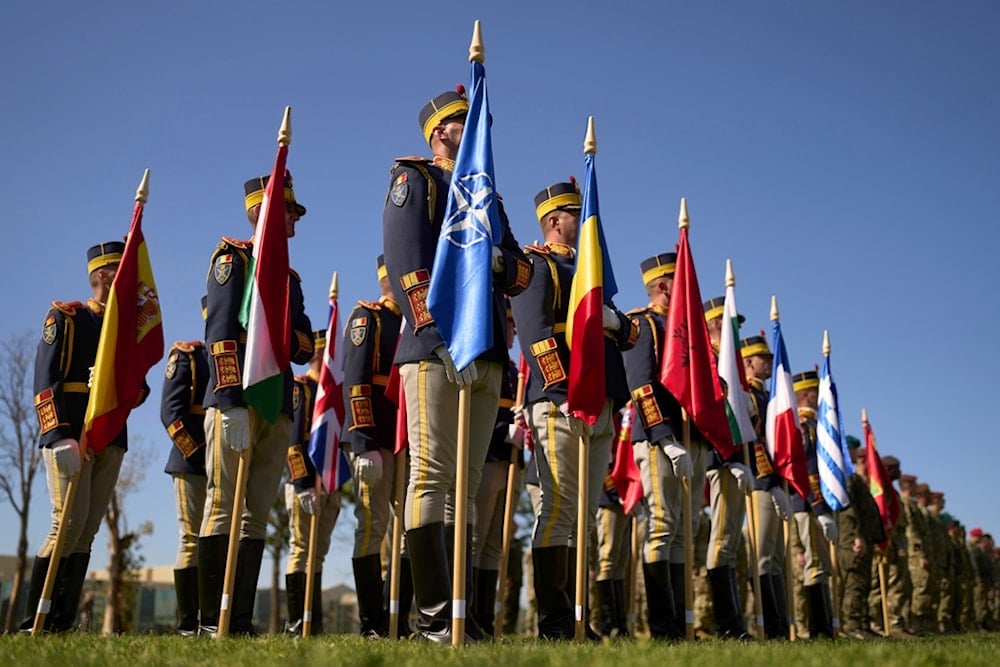NATO discord deepens as allies bicker over Russian airspace breaches
NATO's credibility is faltering as member states squabble over how to respond to Russian airspace violations, exposing deep divisions between hawkish and the more careful allies.
-

Members of the Guard Regiment hold flags of NATO nations during an event marking 10 years since the NATO South-East Command Center (HQ MND-SE) was set up in Romania, Friday, Sept. 19, 2025 (AP Photo/Vadim Ghirda)
Bloomberg on Wednesday reported that NATO partners are struggling to craft a common response to repeated Russian breaches of allied airspace, with starkly different messages emerging from capitals across Europe and Washington.
Tensions flared after what NATO described as a series of incursions, including an incident in which three Russian fighter jets allegedly spent 12 minutes inside Estonian territory over the Gulf of Finland, and earlier drone violations reported in Poland and Romania. The developments prompted Estonia to call for emergency consultations at NATO and the UN Security Council. In response, the alliance launched Operation Eastern Sentry to strengthen air policing and deterrence along its eastern flank, though Moscow has dismissed the accusations as unfounded.
Divided NATO Response
While NATO pledged a "robust" response, consensus on what that means remains elusive. Polish Prime Minister Donald Tusk declared Monday that his country was ready to shoot down aerial threats, insisting there is "no room for discussion" about such a policy. Latvia's President Edgars Rinkevics added that the alliance must consider an upgrade of rules of engagement so "the opening of fire would be an alternative."
Germany has taken the opposite line, warning that a hasty escalation could play directly into Moscow's hands. Defense Minister Boris Pistorius told reporters in Berlin, "Slapdash demands to shoot something out of the sky or do some great show of strength help less than anything else right now… Level-headedness is not cowardice and not fear, but a responsibility towards your own country and towards peace in Europe."
The United States has been sending mixed signals. During talks in New York with Ukrainian President Volodymyr Zelensky, US President Donald Trump said he supported the idea of NATO states downing Russian aircraft that intrude into their skies. Asked directly whether he backed such action, he replied: "Yes, I do." Yet only hours earlier, Secretary of State Marco Rubio had stressed that NATO's policy is to intercept, not fire upon, foreign planes unless they attack.
Read more: Polish security claims Russian jets flew over oil platform in Baltic
The confusion comes against a backdrop of mounting pressure. Spain's Defense Minister Margarita Robles experienced a GPS disruption on her flight to Lithuania this week, while drone sightings forced a shutdown of Copenhagen airport. Poland also invoked Article 4 of the NATO treaty after claiming that Russian drones penetrated its airspace, marking the first time a NATO state has used live fire against drones during the Ukraine war.
Finnish President Alexander Stubb urged caution without weakness. Allies, he said, should "not to overreact but be firm enough, because the only thing Russia understands is power."
Airspace Standoff
From Moscow, Kremlin spokesman Dmitry Peskov rejected Western claims, saying Russia does not violate NATO airspace and denounced accusations as part of a "reckless pattern" of confrontation. Russian officials also defended the drones downed in Poland, saying they were aimed at Ukrainian military facilities and not intended to target NATO states.
Yet Trump, in a separate social media post, suggested that "Putin and Russia are in BIG Economic trouble, and this is the time for Ukraine to act." German Foreign Minister Johann Wadephul interpreted Trump's remarks as a step in the right direction, telling Handelsblatt that the Kremlin's tactics are clear: "First provoke NATO allies and then, in the event of an escalation, act completely surprised and discredit NATO."

 4 Min Read
4 Min Read









